A woman who suffers from extreme periods that cause ‘severe’ pain and make her look ‘pregnant’ has revealed how doctors recommended childbirth to ease her symptoms.
Grace Almey, 21, from Scunthorpe, Lincolnshire, has battled debilitating periods since the age of nine and has endured a range of premenstrual syndrome (PMS) symptoms, including back pain, gastrointestinal problems and hair loss.
Over the years, her condition has led to countless visits to doctors and hospitals, and professionals were so perplexed that, she says, one recommended having a baby at age 15 to alleviate the symptoms.
Grace, who works in HR, said she was left with no choice but to go private, where she shelled out between £5,000 and £6,000 for the surgery. She was eventually diagnosed with a little-known uterine condition called adenomyosis.
Adenomyosis occurs when the lining of the uterus, the endometrium, burrows deep into the muscular wall of the uterus. While the displaced tissue continues to function normally during each menstrual cycle, it can cause an enlarged uterus and painful, heavy periods.
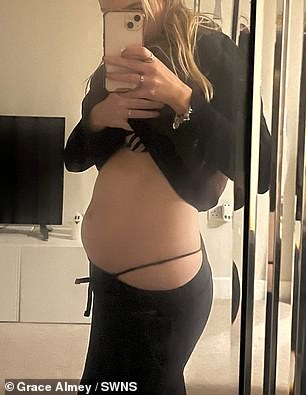
Grace Almey (pictured) says she suffers from extreme periods which cause “severe” pain and a “pregnant” stomach
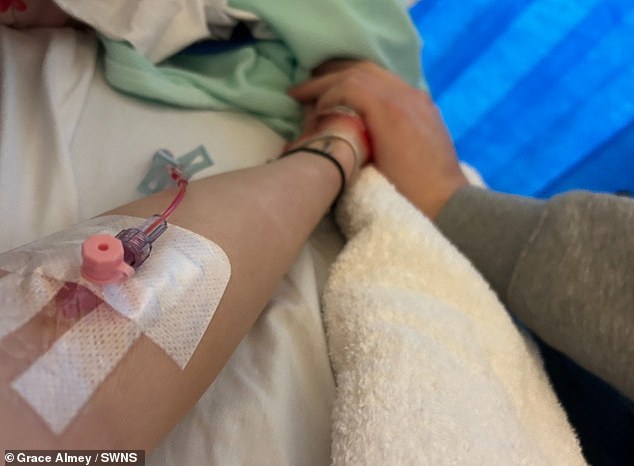
The 21-year-old from Scunthorpe, Lincolnshire, has suffered from a range of premenstrual syndrome (PMS) symptoms, including back pain, gastrointestinal problems and hair loss, since she was nine (Grace pictured in hospital).
Grace says doctors repeatedly dismissed her and even told her she was being too “sensitive.”
‘From the beginning, I had very heavy and very painful periods. Sometimes they lasted three weeks,” Grace said.
‘I often woke up with a very bloated stomach. It honestly looked like I was pregnant. If anyone saw me, they really thought I was pregnant.
“I was an emotional wreck; they told me, ‘You’re just sensitive.’
‘I was about 15 and they told me there was nothing we could do. Normally we would tell women to have a baby.
‘One said: “We know you’re young, but if you decide to have a baby that helps.” “It’s a bad narrative that having a baby will solve gynecological problems.”
She said the pain became so intense that her mother, Joanne, 56, had to drive her back and forth to doctor’s appointments.
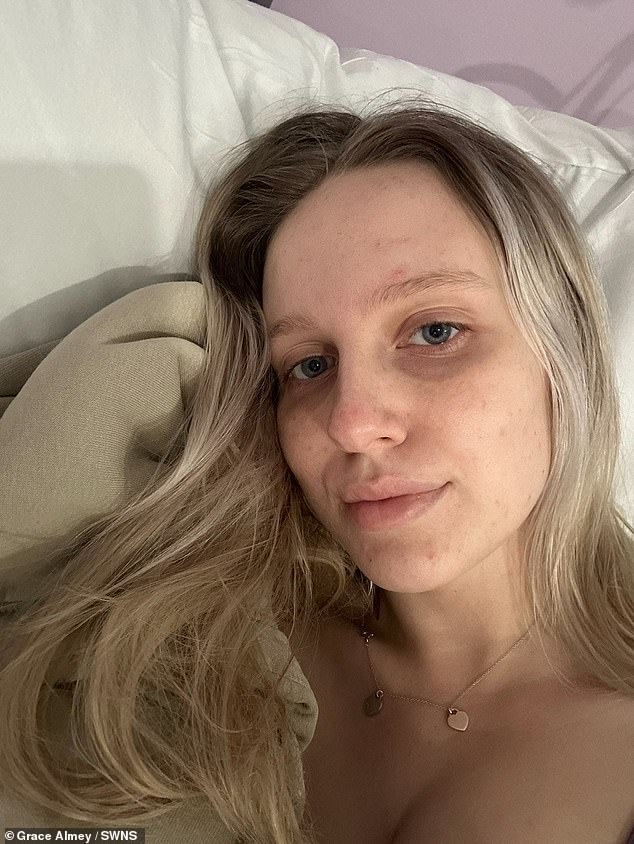
She said doctors were so perplexed by her condition that one recommended she have a baby at age 15 to alleviate the symptoms.
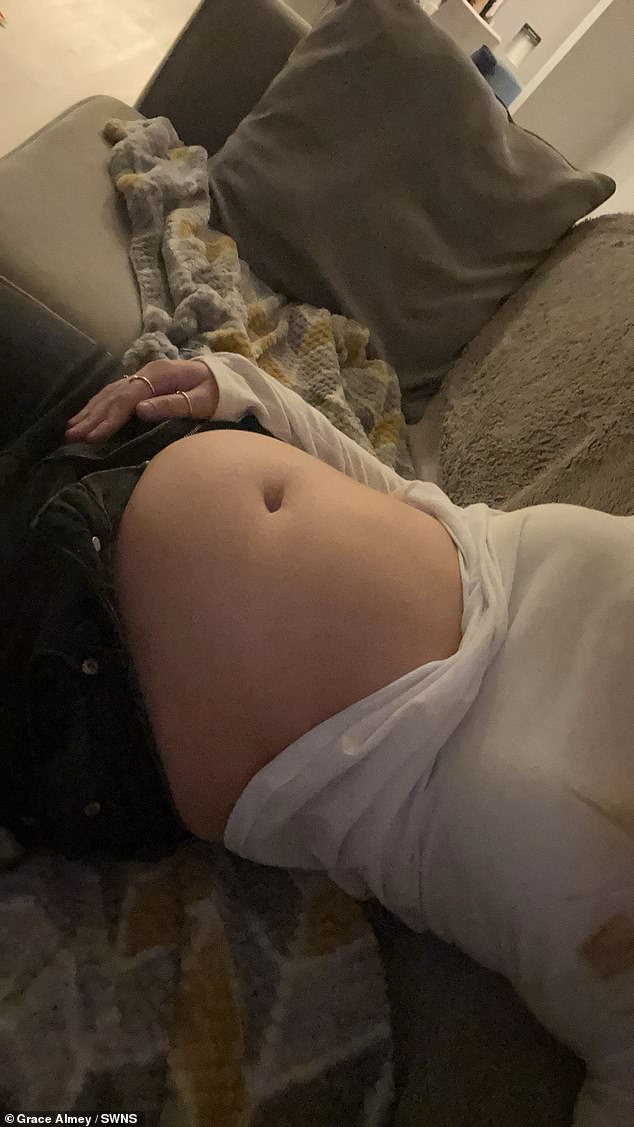
Grace says doctors repeatedly dismissed her and even told her she was being too ‘sensitive’
She was offered several birth control pills and an injection, as well as a hormonal coil to help regulate her cycle, but she claimed that none of them relieved her symptoms.
Her ordeal worsened in January this year when she began experiencing back pain, found it difficult to keep food down and lost her hair. Still, doctors couldn’t determine what was wrong.
“My mother kept taking me to the doctor, but at that age they just said everything would be fine,” he recalled.
‘I was constantly going through sanitary pads (period). My mom washed my sheets constantly. “Sometimes I would just sit in the bathroom and bleed.”
At the age of 12, her periods began to interfere with school, to the point that she needed to take time off.
She added: “I started having very painful bowel movements, it made me nauseous and hot.”
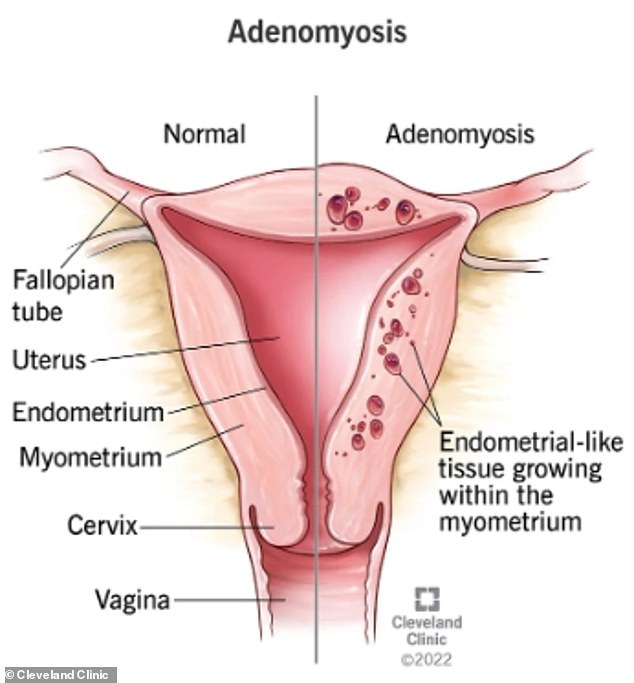
It is not known exactly why adenomyosis occurs. But the NHS notes that women with adenomyosis are “likely” to have a predisposition due to their genes, immune system and hormones.
‘Every time you go to the doctor they tell you there’s not much we can do. They basically tell you to move on. You get used to it.
‘I’m trying everything you recommend and nothing works. At 18 I sort of admitted defeat.”
Grace was eventually admitted for a scan which revealed a cyst on her ovary. She was told the cyst would resolve on its own, but when the pain continued, she was referred back to the hospital.
She was told she would need a colonoscopy, a medical procedure that examines the colon, rectum and anus, but because there was a 12-month wait, she sought private medical care.
Despite this, in May she returned to the hospital with “horrendous” menstrual pain and even the ultrasound was “unbearable.”

Grace has now been diagnosed with adenomyosis. Adenomyosis occurs when the lining of the uterus, the endometrium, burrows deep into the muscular wall of the uterus.
‘It was clear. I was really deflated,’ Grace said. “Between February and May I was trying to live life as I could.”
They told her they wanted to undergo a laparoscopy because doctors believed she had endometriosis.
Endometriosis occurs when the uterine lining grows outside the uterus and affects one in ten women in the UK, while laparoscopy is a test carried out with a camera to analyze the abdomen and pelvis.
For this, he said he chose to do it privately once again due to the worrying stories he said he heard on TikTok.
After undergoing £6,000 to £6,000 surgery in July, a doctor came to her with the results – but it wasn’t what she expected to hear.
“He said ‘we didn’t find any endometriosis,'” Grace recalled. ‘I was absolutely heartbroken. I wanted validation for my pain.’
Then he said “we think you have a disease called adenomyosis.”
In addition to the diagnosis, Grace was recommended to try a progesterone-only pill and her only option to end the pain completely is to undergo a hysterectomy.
Grace added: “It’s located in the uterus and womb; you have it until you have a hysterectomy.” It’s the only way to “cure” it.
‘It’s bittersweet knowing there is something that can help, but it’s not possible at a young age. “I have to live with this until I am willing to have a hysterectomy.”
Grace now tries to take each day as it comes and is trying a holistic approach like avoiding alcohol and ultra-processed foods.
She has also been referred to pelvic floor physiotherapy to see if the tension in her muscles has increased her pain.
‘I’m trying to live day to day. It alters your whole life.’


